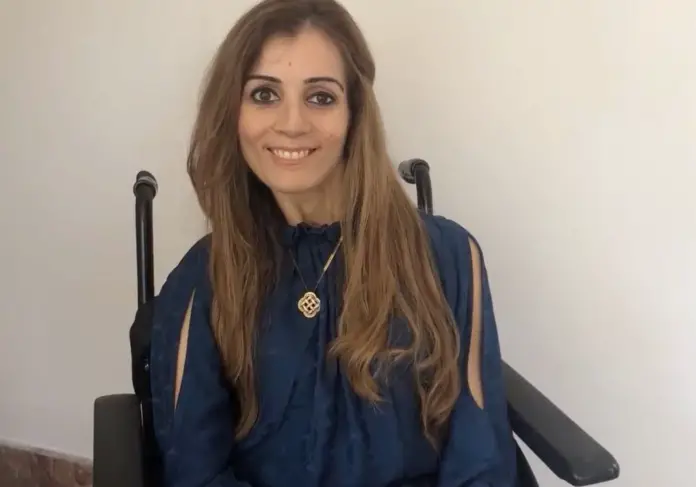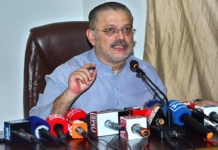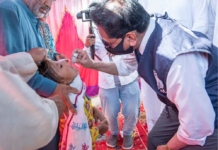She had no idea she would be bound to a wheelchair and be interviewed someday before the tragic car accident in 2002 that changed her life and left her quadriplegic. She could not move independently as both her hands and legs stopped working. Initially, she was not ready to accept the tragedy she had gone through but later she realized that it was the reality she had to live with, and losing hope was not the solution.
Time passed and she went to the United Kingdom for treatment of her spinal cord. She stayed there for a couple of months and during this time, she observed up-to-the mark facilities for persons who were differently abled like her. She had no problem in going anywhere like a restaurant or a park, or other issues moving around. There were ramps, elevators, rest areas and required facilities everywhere she wanted to go.
“I didn’t realize even for a moment that I was a special person in the UK,” said Sana Khursheed, with a smile on her face.
“I learned to live and came to know that there might be many other ways to live life. Believe me it was quite easy for me to go to the markets or to the parks and even using a footpath along a busy roadside during this time,” she stated, thinking that life didn’t stop, because there was everything one needed. She unveiled she learned computer typing in the UK, though her hands couldn’t move.
After a few months stay in the UK, she returned to Pakistan and witnessed a totally different scenario as the system was not ready to accept her and it often made her realize that she was a ‘different kind of person’ in the society.
Restaurants, parks, public and private institutions, roads and streets, buses and railway stations and even the metro stations did not have elevators and special lifts for the differently abled.
She recalled that, “Once I went to a restaurant, and unluckily it did not have an elevator or ramp for a person like me. I was lifted to the second floor and a guy just slipped down, causing me huge mental agony, making me think that it might be devastating. Every time we encountered such a situation, we were just limited to criticizing the system instead of doing anything practically.”
There were hurdles, odds and challenges everywhere. People used to look at her with pity, which was really disappointing. For 20 years, she suffered.
But Khursheed never gave up and decided to stand up against all those challenges and odds, with a firm belief and trust in herself that she had to win the legal fight for the rights not just for herself but for others. For this purpose, first of all, she started writing letters to various departments, asking them to ensure facilities for persons with disabilities, and every time she received just verbal responses and never saw anything practical on their part. Such lethargic approach of the public and private institutions led her to move a petition before the Lahore High Court (LHC) and challenge the lack of facilities for the differently-abled persons.
“I thought if the UK could provide all such facilities to the handicapped persons, then why not Pakistan,” said Sana, who was motivated to continue her struggle.
As the legal battle began, things started to change.
On October 15, 2021, Punjab Minister for Social Welfare and Bait-ul-Maal and Secretary Social Welfare Syed Yawar Abbas Bukhari submitted a progress report and apprised the LHC that they would make a special law for special persons and assured the court that a new chapter regarding dealing with rights and entitlements of persons with disabilities in the original draft act was to be added.
The minister said the suggestions including no discrimination; right to privacy; accessibility and mobility; protection from abusive, violent and intolerant behavior; equity in education; right to live independently in community; right to home and family; freedom of expression and right to information; right of political participation; access to justice; right to inherit and own property; participation in sports, cultural and recreational activities; protection of persons with disabilities in risk and disaster situations and rehabilitation and right to certification would be made part of the act.
The court directed to hold a workshop and convene a meeting on the draft act by inviting other stakeholders and secretaries. In compliance with the court’s orders, the minister held a discussion on the suggestions to make a special law for the disabled persons.
The help of Rukhsana Shah, retired federal secretary, who set up the Autism Welfare Trust in Lahore to create awareness about Autism, ADHD and learning disabilities in Pakistan, was also sought for inclusive education and rights of persons with disabilities.
Khurseed beamed as she came to know that her struggle bore some fruits.
Later, in response to her contention before the court, Punjab secretary social welfare submitted a report before the LHC by saying that after detailed meetings with the Law & Parliamentary Affairs department, Punjab government identified all discrepancies and rectified the same, and on December 2, 2021 after re-articulating several clauses vetted the draft act. He also informed the court that after getting vetted, the draft of the “Punjab Empowerment of Persons with Different Abilities Act, 2021” was submitted to the Standing Committee of the Cabinet on Legislative Business for consideration and approval.
The LHC issued a verdict and held that to enable persons with disabilities to live independently and participate fully in all aspects of life, state parties shall take appropriate measures, to ensure access to the differently abled on an equal basis with others to the physical environment, to transportation, to information and communications technologies and systems, and to other facilities and services open or provided to the public, both in urban and in rural areas. These measures would include the identification and elimination of obstacles and barriers to accessibility
“Fighting the legal battle took a year and finally I won,” said Khursheed, emerging as a human rights activist to fight for others despite being quadriplegic.
“So, now, I believe that if you go with conviction and remain focused on your goal you will achieve it,” she added.







